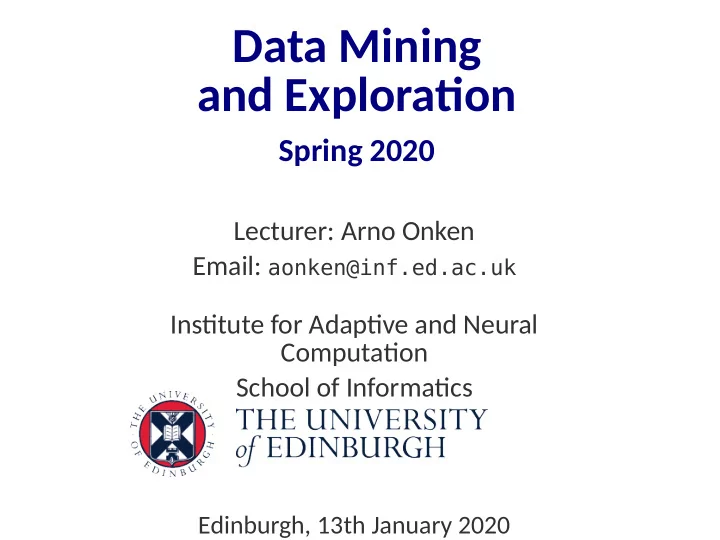

Data Mining and Exploratjon Spring 2020 Lecturer: Arno Onken Email: aonken@inf.ed.ac.uk Instjtute for Adaptjve and Neural Computatjon School of Informatjcs Edinburgh, 13th January 2020
Logistjcs (1) ● Course website: tinyurl.com/ztb675b ● Lecturer office hours: Wednesdays 14-15 IF-2.27A ● For questions and answers, please use Piazza: tinyurl.com/sscpc23 ● TA: Miruna-Adriana Clinciu <m.clinciu@sms.ed.ac.uk> ● Labs: ● Weeks 2-5 ● Robson Building Computer Lab ● Group 1: ● Wednesdays: 09:00 – 10:50 ● Demonstrator: Miruna-Adriana Clinciu ● Group 2: ● Wednesdays: 11:10 – 13:00 ● Demonstrator: Randeep Samra
Logistjcs (2) ● Presentations: ● Poster presentations on research papers during second half of the course ● Potential papers listed on the course website ● Poster PDF deadline for everyone: 24 February 2019 ● Mini-project: ● Apply data mining methods to a real dataset ● List of potential datasets on the course website ● Project report will be assessed ● Course grade: ● 50% exam ● 35% mini-project ● 15% poster presentation
Data Definition of Data from the Oxford Dictionary: ● Facts and statistics collected together for reference or analysis ● The quantities, characters, or symbols on which operations are performed by a computer, which may be stored and transmitted in the form of electrical signals and recorded on magnetic, optical, or mechanical recording media ● Things known or assumed as facts, making the basis of reasoning or calculation. Source: https://commons.wikimedia.org/wiki/File:BigData_2267x1146_white.png Source: https://commons.wikimedia.org/wiki/File:DARPA_Big_Data.jpg
Data Analysis - Data Mining Data Analysis: Server Farm at CERN Inspect, transform and model data to discover useful information Source: https://commons.wikimedia.org/wiki/File:CERN_Server_03.jpg Data Mining: Particular data analysis technique; extraction of patterns and knowledge from large amounts of data for predictive rather than descriptive purposes Source: https://commons.wikimedia.org/wiki/File:J-psi_p_pentaquark_mass_spectrum.svg
Exploratory Data Analysis Exploratory Data Analysis (EDA) is a tradition of data analysis to avoid wrong interpretations of suggestive results EDA emphasises: ● Graphic representation of the data ● Understanding of the data structure ● Robust measures, re-expression and subset analysis ● Tentative model building in an iterative process of model specification and evaluation ● General scepticism and flexibility with respect to the choice of methods
EDA: Graphic Representatjon of the Data Source: https://seaborn.pydata.org/_images/seaborn-violinplot-2.png Source: https://commons.wikimedia.org/wiki/File:MultivariateNormal.png
EDA: Understanding of the Data Structure single outlier
EDA: Robust Measures
EDA: Tentatjve Model Building Data Iterative process EDA Pre- processing Familiarity Cleaned Models Building Data Fitting
Data Analysis Process Population Ideas Data Collection Data Data Products EDA Result Production Communication Pre- processing Familiarity Cleaned Models Building Data Fitting
Course Content Population Ideas Data Collection Data Data Products EDA Weeks 1-3 Result Production Communication Pre- Presentations processing Familiarity Reports Weeks 4-5 Cleaned Models Building Data Fitting
Purpose of Partjcular Course Elements ● Lecture material and computer labs ● Numerical data descriptions and pre-processing (Week 1) ● Establish common language ● Highlight importance of simple measures ● In depth Principal Component Analysis (Week 2) ● Describe important method in all its aspects ● Dimensionality reduction (Weeks 3-4) ● Closely related techniques ● Predictive modelling and generalization (Week 5) ● Round off data analysis process ● Poster sessions ● Train presentation of research results in the style of an academic conference ● Exposure to wide range of topics ● Mini-projects ● Full data analysis process
Positjve Skewness
Fourth Power
Uncorrelated and Dependent Source: https://en.wikipedia.org/wiki/Pearson_product-moment_correlation_coefficient
Scatuer Plot
Histogram
Kernel Density Plots Source: https://en.wikipedia.org/wiki/Kernel_(statistics)
Box Plot Source: https://en.wikipedia.org/wiki/Box_plot
Violin Plot Source: https://en.wikipedia.org/wiki/violin_plot
Recommend
More recommend